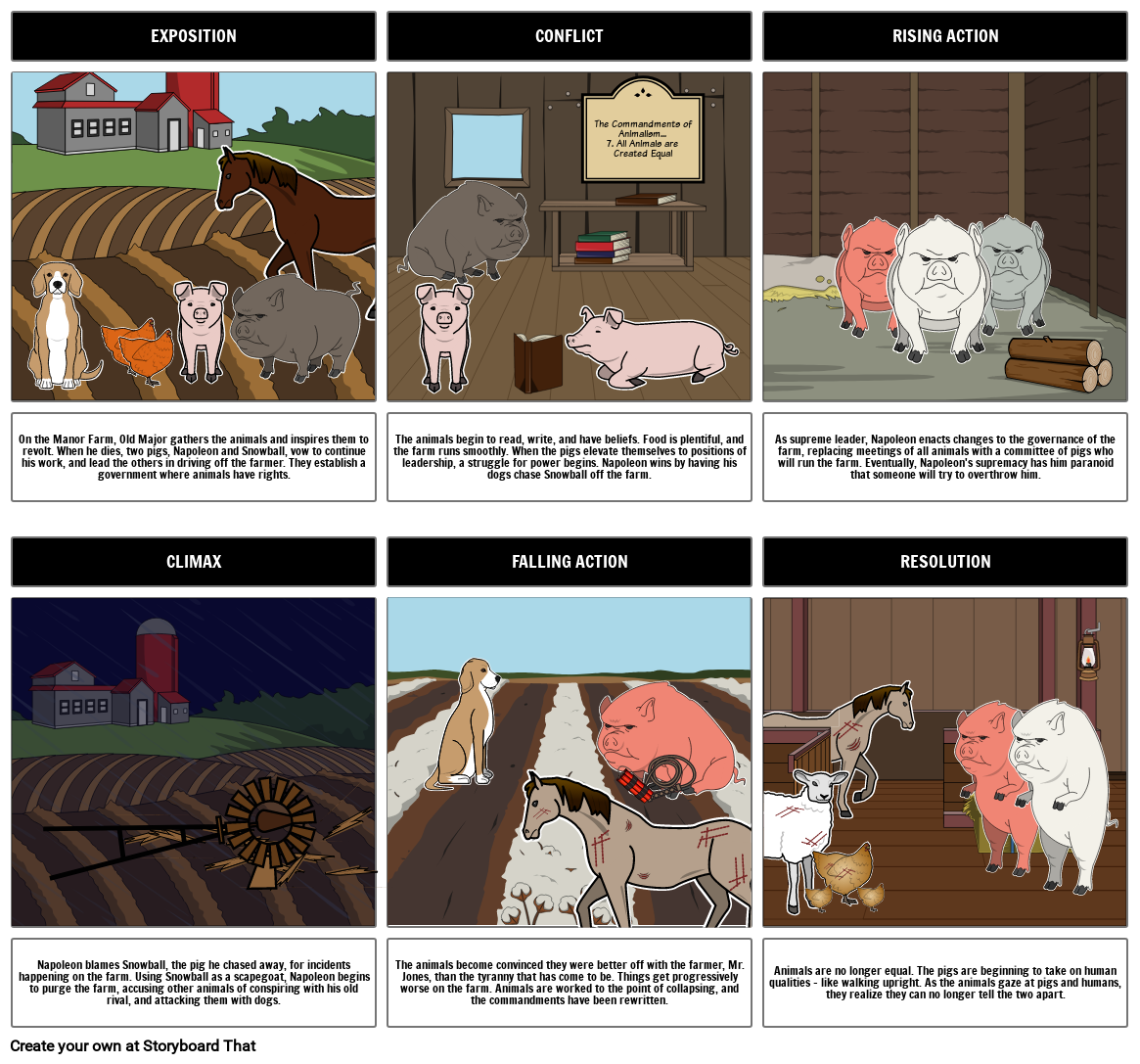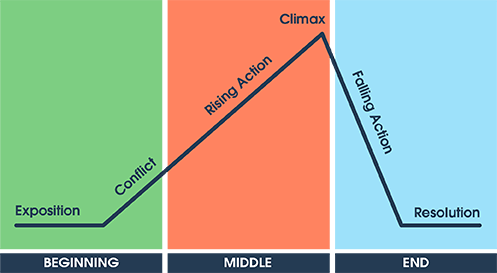Activity Overview
A common activity for students is to create a plot diagram of the events from a novel. Not only is this a great way to teach the parts of a plot, it also helps to reinforce major events, and helps students develop greater understanding of literary structures.
Students can create a storyboard that captures the narrative arc of a story with a six-cell storyboard which contains the major parts of the plot diagram. For each cell, have students create a scene that follows the novel in sequence, using: Exposition, Conflict, Rising Action, Climax, Falling Action, and Resolution.
Template and Class Instructions
(These instructions are completely customizable. After clicking "Copy Activity", update the instructions on the Edit Tab of the assignment.)
Student Instructions
Create a visual plot diagram of Animal Farm.
- Separate the story into the Exposition, Conflict, Rising Action, Climax, Falling Action, and Resolution.
- Create an image that represents an important moment or set of events for each of the story components.
- Write a description of each of the steps in the plot diagram.
Lesson Plan Reference
Rubric
(You can also create your own on Quick Rubric.)
| Proficient 25 Points | Emerging 21 Points | Beginning 17 Points | Try Again 13 Points | |
|---|---|---|---|---|
| Descriptive and Visual Elements | Cells have many descriptive elements, and provide the reader with a vivid representation. | Cells have many descriptive elements, but flow of cells may have been hard to understand. | Cells have few descriptive elements, or have visuals that make the work confusing. | Cells have few or no descriptive elements. |
| Grammar/Spelling | Textables have three or fewer spelling/grammar errors. | Textables have four or fewer spelling/grammar errors. | Textables have five or fewer spelling/grammar errors. | Textables have six or more spelling/grammar errors. |
| Evidence of Effort | Work is well written and carefully thought out. Student has done both peer and teacher editing. | Work is well written and carefully thought out. Student has either teacher or peer editing, but not both. | Student has done neither peer, nor teacher editing. | Work shows no evidence of any effort. |
| Plot | All parts of the plot are included in the diagram. | All parts of the plot are included in the diagram, but one or more is confusing. | Parts of the plot are missing from the diagram, and/or some aspects of the diagram make the plot difficult to follow. | Almost all of the parts of the plot are missing from the diagram, and/or some aspects of the diagram make the plot very difficult to follow. |
How To Explain and Analyze the Moral of the Story in Animal Farm
Research Contextual Background
Encourage the students to learn about the historical background of the Russian Revolution. Understanding the allegory will be made easier if you are familiar with the emergence of communism, and the subsequent creation of the Soviet Union. Before actually reading the story, teachers can give students some background of significant events in history that influenced the author to write this story.
Highlight Themes
Discuss the central ideas and the basis of conflicts in the story, Ask the students to highlight these themes and try to understand the intentions of the author and why he has used these themes in the story.
Identify Significant Points
Ask the students to find the key turning points in the narrative. Examples of key events that influence the story include Snowball's exile, the purge on the farm, and the redoing of the Commandments. Ask the students to explain and analyze how these events impact the overall story. Students can also use the Cause and Effect activity to understand the relationship between events.
Organize Group Discussions
Divide the class into groups of 3-4 students. Give each group a certain topic to discuss from the story and ask them to come up with arguments and analysis of that topic. At the end, combine the entire class and begin the discussion by connecting the topics.
Make Connections With Life
Describe how the story's experiences and teachings might be applied to everyday life. This might include instances where people are under the influence of power so much that they forget what they were actually fighting for. Teach the students how history is repetitive and ask them to analyze the reason behind this repetition.
Frequently Asked Questions About Animal Farm Summary/ Plot Diagram
What is the climax of the story?
The fight between the animals after Napoleon blames Snowball and the other animals for betrayal signifies the climax of the story. In a crucial scene, Napoleon attacks the other animals with the dogs and blames them for all the incidents happening on the farm. This attack leads to the rest of the animals regretting their decision and finding the Pigs the same as humans who once used to abuse their powers.
What moral lesson or message does the story convey?
The main lesson of "Animal Farm" is a warning about the corrupting influence of authority. It serves as an example of how even well-intended revolutions may be sabotaged by those vying for power, resulting in inequality and tyranny. Students can also reflect on how this abuse of power becomes toxic for other people and why people who fight for the revolution become part of the problem themselves.
More Storyboard That Activities
Animal Farm
Pricing for Schools & Districts
© 2024 - Clever Prototypes, LLC - All rights reserved.
StoryboardThat is a trademark of Clever Prototypes, LLC, and Registered in U.S. Patent and Trademark Office










